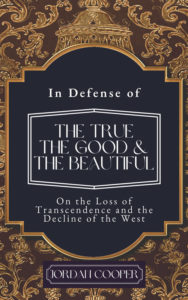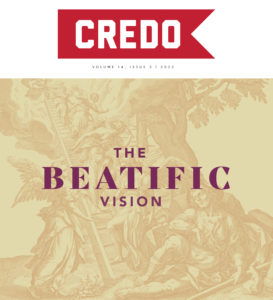In his dense little volume, The Abolition of Man, C.S. Lewis warned against the devolution of education he saw in his own day. Fleeing the scene was the old understanding of education as virtue formation. No longer were students expected to search for the good, the true, and the beautiful so as to be shaped and conformed into those transcendentals. What Lewis dreaded was the mechanistic and flat conception of reality put forward by scientism, which stripped all the cosmos of any sense of meaning. Meaning, for the modern educators whom Lewis had in his sights, was not real or objective, but was rather the imposition of wishful thinking. Lewis saw the writing on the wall, and he predicted this kind of intellectual and educational shift would sow the seeds of western civilization’s demise. It would produce a society of “men without chests.” If a society of “men with chests” is one in which “the good life” is conformity to the transcendentals, rather than self-expressive individualism, many (in Lewis’s day, and in our own) might think they would rather have “men without chests,” but Lewis powerfully explains how this will lead to more than they bargained for:
Such is the tragi-comedy of our situation—we continue to clamor for those very qualities we are rendering impossible. You can hardly open a periodical that says our civilization needs is more ‘drive’, or dynamism, or self-sacrifice, or ‘creativity’. In a sort of ghastly simplicity we remove the organ and demand the function. We make men without chests and expect of them virtue and enterprise. We laugh at honor and are shocked to find traitors in our midst. We castrate and bid the geldings be fruitful.
If Lewis was predicting what a society of “men without chests” might look like, it would appear that we find ourselves in the position of being able to describe it from the inside. What is the way forward? In his excellent book, I n Defense of the True, the Good, And the Beautiful: On the Loss of Transcendence and the Decline of the West (Just and Sinner Publications, 2021), Jordan B. Cooper offers some suggestions. Unfortunately for those who are disposed for quick fixes, Cooper does not offer silver bullets. When it becomes clear that we have taken a wrong turn at the fork in the road, there is no path forward apart from going back. Cooper’s prescription on how to “put chests back into men” is to simply take the old roads long-abandoned: we need to recover the true, the good, and the beautiful. Cooper paints a compelling picture of the classical vision of reality, a bleak picture of the late-modern version that has replaced it, and a hopeful picture of how we might—as individuals and communities—restore some of what was lost. Dr. Cooper is an ordained Lutheran pastor, Executive Director of Just and Sinner, and President of the American Lutheran Theological Seminary. He has authored several books and is the host of the Just and Sinner Podcast. In this interview, Credo Editor Sam Parkison interviews Cooper on his recent defense of the true, the good, and the beautiful.
n Defense of the True, the Good, And the Beautiful: On the Loss of Transcendence and the Decline of the West (Just and Sinner Publications, 2021), Jordan B. Cooper offers some suggestions. Unfortunately for those who are disposed for quick fixes, Cooper does not offer silver bullets. When it becomes clear that we have taken a wrong turn at the fork in the road, there is no path forward apart from going back. Cooper’s prescription on how to “put chests back into men” is to simply take the old roads long-abandoned: we need to recover the true, the good, and the beautiful. Cooper paints a compelling picture of the classical vision of reality, a bleak picture of the late-modern version that has replaced it, and a hopeful picture of how we might—as individuals and communities—restore some of what was lost. Dr. Cooper is an ordained Lutheran pastor, Executive Director of Just and Sinner, and President of the American Lutheran Theological Seminary. He has authored several books and is the host of the Just and Sinner Podcast. In this interview, Credo Editor Sam Parkison interviews Cooper on his recent defense of the true, the good, and the beautiful.
Why are transcendentals so relevant for today?
As our culture is facing a moment of crisis on various fronts, there have been a lot of popular attempts to criticize woke culture, postmodernity, and radical gender politics. As I listened to and read some of these popular voices, it became increasingly clear that many cultural critics don’t have much of a solution to our problems. People recognize that something is wrong, but they don’t often get to the root of these issues. It’s one thing to poke fun at liberals on TikTok but another to provide a positive vision of what it is that the culture needs to recapture. I felt that most sources in our culture war didn’t adequately answer the second question.
For many popular influencers on the right, the solution is to return to some kind of neo-Enlightenment rationalism. I argue that we can’t simply turn back the clock one or two hundred years in the past and simply continue as things were. The issues that we face today are not in spite of the ideas developed in modernity, but are instead the inevitable result of it. What we are seeing is the fallout of a classical realist philosophy as taught by the Greeks and inherited in the Christian West. What we are seeing is the fallout of a classical realist philosophy as taught by the Greeks and inherited in the Christian West. Click To Tweet
This work was written as an attempt to get to the core of our current woes as I was becoming repeatedly disappointed in responses on the right from both secular and Christian sources on progressive ideologies.
Why has society collapsed?
Culture began its descent into our current madness at the moment that the transcendental foundations of society began to collapse. God himself is the anchor that holds all things together, and that includes society and government. These foundations are expressed through the three transcendentals of Truth, Goodness, and Beauty.
I categorize this collapse through an overview of the history of philosophy and culture. My hope is that readers will begin to recognize these foundational shifts, and then when looking at cultural ideas, can see them through this lens. This means that when solutions are put together, they don’t simply address the symptoms of our cultural ills, but the illness itself.
I must also say that I don’t provide some kind of extensive list of solutions in this text. I certainly have some ideas about that, but the book is more about diagnosing the disease than outlining the cure. What the reader will gain is a knowledge of the general solution: the recapturing of our transcendental foundations. The particulars of how that is to be done, however, is perhaps the work of a follow up book.
What is the value of historical and philosophical surveys (as opposed to works of specialization).
A book of this sort is difficult, because it will necessarily have to pick some ideas to focus on, and other to either skip over or treat very tangentially. I don’t, for example, have a lengthy treatment of existentialism or the development of gender theory and intersectionality. But, if the book was to serve its intended purpose as something that could be read by the non-specialist, this was a necessary thing to do.
Survey works are helpful for a couple reasons. First, works of specialization can miss the broader picture in terms of how various ideas or movements fit together and influence one another. Anyone studying ideas in history must balance the exposition of particular figures’ thoughts within their own intellectual system, and the bigger history of ideas in which those thoughts fit. Second, a book like this is something that can be read by someone who does not have the interest or time to read on individual thinkers and philosophers. I wanted to put something together that someone without much knowledge of philosophy could use as a general guide or manual to Western thought.
Why not treat truth, goodness, and beauty separate from one another?
I can understand why someone would have that thought initially, as we don’t usually think of these three realities as inherently connected. Materialists often affirm absolute truth but reject objectivity in the realm of moral goodness and standards of beauty. The majority of Christians likely affirm absolutes in the realms of truth and goodness, but are basically subjectivists in the realm of aesthetics.
For the classical world, however, these three realities stand or fall together. They are part of the same basic affirmation, that God is to be identified as the transcendent foundation through which all things are to be judged. God is the Truth. He is Goodness. He is beauty. It is my contention that the divorce of these realities from one another is the root issue in the affirmation of pure subjectivism which captivates us today. Thus, they must be addressed together.
Without being overly flat and reductionistic, you make several illustrative contrasts: classical vs modern/post-modern, objective vs subjective, supernatural vs natural. One important contrast you call attention to is realism vs nominalism. Why is this one so central?
The realism/nominalism debate probably sounds to many like the height of philosophical disputations which are irrelevant beyond the academy. This is unfortunate, as such a thing could not be farther from the truth. Though to properly explain the debate it would take a while, I will try to give a very brief summary of these two positions.
The realist says that what the mind observes are reasons in the natural world corresponds to real ideas. For example, when I look at an object that has three connected sides, my mind reads this as a triangle. Triangularity, as an idea, is something that is real. When I picture a triangle in my mind and see one in the natural world, there is something connecting the reality in my mind to what exists outside of it. This means that we are capable of really understanding the world as it is.
Nominalism denies this. For the nominalist, the concepts that we use to explain things like triangularity are not real. The triangle is merely a category created by the mind or in language to categorize disparate things that we see as being similar. In this way, the way we see the world is something that we impose on it, rather than something abstracted from it. Most philosophers of the modern period have been nominalists of one kind or another. This leads to skepticism of all sorts of things. Click To Tweet
Most philosophers of the modern period have been nominalists of one kind or another. This leads to skepticism of all sorts of things. If my mind doesn’t grab onto reality as it is, how can I really know what is true, good, or beautiful? This leads us to turn everything internally to our own subjective experience.
You have given us an apologetic for Christianity of sorts. You include polemic critiques of modern, nominalist, and naturalistic conceptions of the world, but you also commend the classical tradition in general—and the classical-Christian tradition in particular—as not only correct, but also lovely and desirable. You’re not simply showing the bankruptcy of Christianity’s alternatives, you’re also commending the enriching treasures of a classical Christian tradition. Could you comment on this strategy and the role of the affections in apologetics?
There is absolutely an apologetic angle to this book. It is my hope that it may spur on some people to think about the truths of Christianity who are sure that something is wrong with the world, but not convinced of exactly what is right. I tried not to just blatantly speak to Christians throughout the text.
The method of approaching the classical philosophical world that I take is not one of pure opposition between Christian revelation and the ideas of the Greeks. Christianity, as it developed in the ancient world, incorporated aspects of Plato, Aristotle, Stoicism, and others into their systems. For this classical tradition as a whole, the question of truth is not simply: what ideas corresponds to reality? More than this, that which is true is valuable. And that which is valuable is to be loved.
We are not mere thinking machines making logical deductions about what theories are most probable. We are creatures that desire, delight in things, respond with joy or sorrow, and generally live through our affections. Thus, to speak about the truth of Christianity is also to speak of the beauty of Christianity. It is not only factually true, but also beautiful and good. Any good apologetic should deal with all of these angles.
You commend the classical vision of the good, the true, the beautiful, which is often a synthesis of Christian thought with some features of the Greek philosophical, mythical, artistic, and religious tradition (which, to state the obvious, is pagan). Why is this kind of embrace of natural theology so crucial ? And why should Christians not be wary of it?
Natural theology is crucial simply because Scripture itself presents such a thing as valid. Though I won’t give away too much of the argument, I contend that the New Testament recognizes that the Greek thinkers found aspects of truth in the world, both in terms of God’s existence and of the virtuous life. In Lutheran parlance, natural revelation provides guidance for the Kingdom of the left (the common culture), whereas special revelation must guide the Kingdom of the right (the church). Especially when we are talking about culture, natural reason can provide a lot of good and helpful guidance. On certain questions, the Greeks tended to do much better than many post-Enlightenment thinkers in the West.Natural revelation provides guidance for the Kingdom of the left (the common culture), whereas special revelation must guide the Kingdom of the right (the church). Click To Tweet
Since all truth is God’s truth, and man is made in the image of God, finding bits of truth and goodness and beauty among pagans, and appropriating some of their categories as Christians is to be expected. But how should this principle work in an increasingly international and multi-cultural context?
My own expertise is specifically in Western culture. By “Western culture,” I mean that culture which was influenced by the ancient Greeks then into ancient Rome and appropriated by the Christian world. Contrary to how the phrase is used in popular parlance, this is not identical to the culture of Western Europe, as what is defined as “Western” is really a conglomeration of a variety of various cultures and peoples.
With that being said, I am not of the opinion that there are no helpful categories or points of contact between Christian thought and the history of ideas in India, China, or other Eastern civilizations. However, those are not my areas of expertise, nor are they my culture. I’d love to see people from those cultures explore more connections with their categories and mythology as they relate to the Christian world. However, as is in the subtitle of this book, I am speaking quite specifically about the West.
A twentieth century apologist like C.S. Lewis interacting with the polytheism of the Greek pantheon is one thing—the religious practices associated with them were long-ceased when he offered his reflections. But the religious practices associated with the polytheism of Hinduism, for example, is very much still alive and well. How does that influence our attempts to salvage its tradition for God-glorifying reflections on goodness, truth, and beauty?
Within Hinduism or any other polytheistic religion, there are elements of truth or points of connection with Christianity. Many world myths capture essential needs and desires of us as created beings, which express themselves in various forms of storytelling. Because of the Fall, people seek the fulfillment of such desires in false religions. However, that doesn’t mean that there isn’t some underlying need or desire which is being addressed thereby.
Think, for example, of Carl Jung’s popular concept of the collective unconscious. There are themes and ideas that seem to be universal, appearing across time and place. For Jung, these come out in our myths, but have their roots in our evolutionary development. I would argue that these unconscious ideas do exist, though as an element of our divine origin, rather than a mere biproduct of evolutionary processes.
So, when speaking to a Hindu or someone of another faith, it can help to begin with these points of similarity as a place of contact like Paul does at the Areopagus. But we recognize the limits of where those similarities end, and must proclaim the good news of Jesus Christ which is the sole means by which salvation is granted.
You are a scholar and a theologian whose research has invariably included certain aspects of the history of philosophy. However, you are also a minister of the Lutheran Church, and concern for your congregation is surely never far from view in any of your projects. What does our conversation have to say to pastors?
I’m certainly not expecting pastors to pick up this book and start preaching on Plato or Aristotle. However, I do think it will help those ministering in the midst of a contentious culture to understand the root reasons why things are the way they are. This can help frame the way in which ideas are spoken about to congregants in Bible studies, preaching, or just helping people to navigate the challenges of the world. There also will be those Christians who want the kinds of deep answers to our cultural problems which may require a little bit of philosophy.



